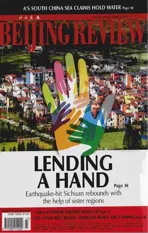No Longer Calling the Shots
2011-10-14ByCHENXIANGYANG
By CHEN XIANGYANG
No Longer Calling the Shots
By CHEN XIANGYANG
The G8 Summit is unlikely to make a significant impact on pressing global issues

This year’s Group of Eight (G8) Summit was held from May 26 to 27 in Deauville, France. Topics included the ongoing war in Libya, Japan’s nuclear disaster and bumps in the road to economic recovery. Given the rise of emerging economies, Western nations stressed their common interests and values, intending to maintain their dominance over international affairs.
The summit issued an optimistic declaration about the current world economic situation. It pointed out that the economic situation is getting better in more regions, while admitting there are still risks, like rocketing commodity prices.
The economies of the United States, the EU and Japan have shown sluggish growth in recent years, which poses a sharp contrast against the strong economic growth of emerging economies. To relieve the international community’s concerns, all three expressed confdence about their future inthe declaration.
The EU promised to solve its sovereign debt problem. The United States emphasized its willingness to build a clear and credible medium-term fscal consolidation framework. Japan vowed to focus on sustainable public finances while conducting post-quake reconstruction.
A pressing topic at this year’s G8 Summit was how to deal with the ongoing turmoil in the Middle East. By coordinating their policies, the seven most developed Western nations, formerly known as G7, aimed to jointly interfere with the domestic affairs of Middle East nations.
The G8 not only invited representatives from Egypt and Tunisia, which had undergone power transitions, but also offered attractive incentives to nations trying to launch reforms. The G8 promised a huge aid package to Egypt and Tunisia, including $20 billion from the World Bank and $10 billion in aid from G8 members. Saudi Arabia, Qatar and Kuwait pledged another $10 billion.
At the same time, the G8 called on Libyan leader Muammar Gaddafi to step down and showed support for his opposition. While the summit was in session, NATO carried out intensified air strikes against Gaddaf.

WU WEI
Russian’s attitude toward Libya took a drastic change that shocked the world. Russian President Dmitry Medvedev announced at the G8 Summit that as the Gaddaf regime lost its legitimacy, Russia was reaching out to the Libyan opposition.
Besides, Medvedev said the G8 had reached a consensus on the nomination of a candidate for the IMF chief to replace Dominique Strauss-Kahn, who resigned following a scandal in May, trying to show Russia’s common stance with the G7.
Even in the name of “democracy” and“human rights,” the G8 will face mounting diffculties intervening in the domestic affairs of Middle East nations and dominating world affairs.
The United States, the EU and Japan all face serious fnancial problems. It is impossible for Western powers to help Middle East nations when their pockets are half empty. Their blank checks will be diffcult to cash.
Despite shared interests and values, the United States and the EU also have disagreements. For example, they hold conficting views on the reform of the international monetary and fnancial systems.
As the rise of emerging nations is inevitable, Western nations can no longer dominate international affairs. On the economic front, the G8 has been replaced by the G20, which consists of both industrialized and emerging economies. On a political and security level, the G8 cannot compete with the UN Security Council. The G8 is therefore doomed to be marginalized.
The author is an associate research fellow with the China Institutes of Contemporary International Relations
